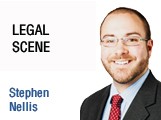Amgen case before SCOTUS could stymie new class-action suits

On Nov. 5, Thousand Oaks-based Amgen argued a case before the U.S. Supreme Court that could make it much harder for shareholders to form a class when suing a company for making misleading statements that distort its stock price.
The outcome, which is likely to be decided by the politics of the individual justices, could have nationwide implications, including on a few active cases right here in the Tri-Counties.
Amgen v. Connecticut Retirement Plans and Trust Funds sprung from allegations that Amgen’s top brass propped up the company’s stock price with misleading public statements about the safety risks of the company’s biggest-selling drugs for nearly three years. Those risks led to a surprise decision by Medicare and Medicaid to cut federal reimbursements and sent Amgen’s shares tumbling in 2007.
But the crux of the case is shareholder class certification. Amgen argues that a class shouldn’t be certified until the allegedly misleading statements are proved material to the company’s stock price. The funds, on the other hand, argue that materiality is the heart of the case and should be reserved for the trial or a summary judgment, not early class proceedings.
Overshadowing the legal question is the practical fact that class certification usually means a settlement to avoid trial, regardless of the case’s merits. That’s why the U.S. Chamber of Commerce has backed Amgen’s position. Indeed, pretty much any market surprise generates a lawsuit these days.
Pacific Capital Bancorp, the parent of Santa Barbara Bank & Trust, recently paid $1 million to settle a shareholder class action over its deal to sell to Union Bank, even though the deal included a hugely profitable premium for shareholders. Goleta-based Deckers Outdoor Corp., the parent of the Ugg shoe brand, is facing shareholder suits about what it knew about sheepskin prices and when it knew it.
Class certification in these cases flows from the so-called “fraud on the market” theory that was formulated in 1988 in a case called Basic Inc. v. Levinson. In that case, the Supreme Court ruled that shareholders are presumed to rely on the price of a stock to make decisions about whether to buy or sell. In an efficient market, the theory goes, any material statements are integrated into the price of the stock. So if an investor buys a stock based on the price, it implicitly relies on any material statements that a company might have made, including misleading or false ones.
Investors seeking to form a class can say they all relied on the stock price to make a decision rather than each having to prove they relied on a particular set of false or misleading material statements. It makes class certification easier.
But when should the defense have the chance to rebut the presumption of reliance on the stock price? Amgen wants to do that at the class certification stage by asking a judge to rule on the materiality of the statements. If the statements aren’t material, then they aren’t integrated into the stock price, and thus the shareholders relying on price couldn’t have relied on the statements in question.
If that sounds to you like ruling on materiality is essentially ruling on the whole case during class certification hearings, you’re of the same mind as Justice Elena Kagan: “It can’t proceed as an anything action, can it? [T]he remedy, if you had thought that the statement was immaterial, is not to say, I won’t approve a class. It would be to say the suit has no merit,” she said in the transcript.
Later in the discussion, Seth Waxman, a former U.S. solicitor general arguing for Amgen, got to the heart of the matter: “The real question in this case is what is the purpose of [class action specifications] Rule 23? If you think that the purpose of Rule 23 is to postpone to the merits everything that can be postponed without a risk of foreclosing valid individual claims, we lose. But that’s not the purpose. The purpose is for a court to determine whether all of the preconditions for forcing everyone into a class action are present before you certify.”
Chief Justice John Roberts voiced a restrained skepticism about the fraud-on-the-market theory, as did Justice Anthony Kennedy, considered a swing vote on the court. Justice Samuel Alito asked no questions and Justice Clarence Thomas maintained his customary silence. Justice Antonin Scalia voiced the deepest critique: “[M]aybe we shouldn’t have this fraud-on-the-market theory. … [Y]ou can only rely on an efficient market where there has been a material misrepresentation. So maybe we should overrule Basic because it was certainly based upon a theory that … simply collapses once you remove the materiality element.”
Given the Supreme Court’s track record on business cases, my money normally would be on Chief Justice Roberts to write an opinion as narrowly as possible in Amgen’s favor. But in this case, you can’t really allow a materiality ruling at the class certification stage without basically overturning the fraud-on-the-market theory. I wouldn’t be surprised by a 5-4 ruling in Amgen’s favor with a strong Scalia-authored majority opinion.
• Contact law columnist Stephen Nellis at [email protected].











